Hogyan importálhat több szövegfájlt egy mappából egy munkalapba?
Például itt van egy mappája, amely több szöveges fájlt tartalmaz, amit meg kell tennie, hogy ezeket a szöveges fájlokat egyetlen munkalapba importálja, az alábbi képernyőkép szerint. A szöveges fájlok egyesével történő másolása helyett vannak-e trükkök a szövegfájlok gyors importálására egy mappából egy lapra?
Több szöveges fájlt importálhat egy mappából egyetlen lapba a VBA segítségével
Importáljon szöveges fájlt az aktív cellába a Kutools for Excel segítségével ![]()
Több szöveges fájlt importálhat egy mappából egyetlen lapba a VBA segítségével
Itt egy VBA-kód segíthet az összes szövegfájl importálásában egy adott mappából egy új munkalapba.
1. Engedélyezze a szövegfájlok importálásához szükséges munkafüzetet, majd nyomja meg az gombot Alt + F11 gombokat az engedélyezéshez Microsoft Visual Basic for Applications ablak.
2. kettyenés betétlap > Modulok, másolja és illessze be a VBA kód alá a Modulok ablak.
VBA: Több szövegfájl importálása egy mappából egy lapra
Sub Test()
'UpdatebyExtendoffice6/7/2016
Dim xWb As Workbook
Dim xToBook As Workbook
Dim xStrPath As String
Dim xFileDialog As FileDialog
Dim xFile As String
Dim xFiles As New Collection
Dim I As Long
Set xFileDialog = Application.FileDialog(msoFileDialogFolderPicker)
xFileDialog.AllowMultiSelect = False
xFileDialog.Title = "Select a folder [Kutools for Excel]"
If xFileDialog.Show = -1 Then
xStrPath = xFileDialog.SelectedItems(1)
End If
If xStrPath = "" Then Exit Sub
If Right(xStrPath, 1) <> "\" Then xStrPath = xStrPath & "\"
xFile = Dir(xStrPath & "*.txt")
If xFile = "" Then
MsgBox "No files found", vbInformation, "Kutools for Excel"
Exit Sub
End If
Do While xFile <> ""
xFiles.Add xFile, xFile
xFile = Dir()
Loop
Set xToBook = ThisWorkbook
If xFiles.Count > 0 Then
For I = 1 To xFiles.Count
Set xWb = Workbooks.Open(xStrPath & xFiles.Item(I))
xWb.Worksheets(1).Copy after:=xToBook.Sheets(xToBook.Sheets.Count)
On Error Resume Next
ActiveSheet.Name = xWb.Name
On Error GoTo 0
xWb.Close False
Next
End If
End Sub3. nyomja meg F5 párbeszédpanel megjelenítéséhez, és válassza ki az importálni kívánt szöveges fájlokat tartalmazó mappát. Lásd a képernyőképet: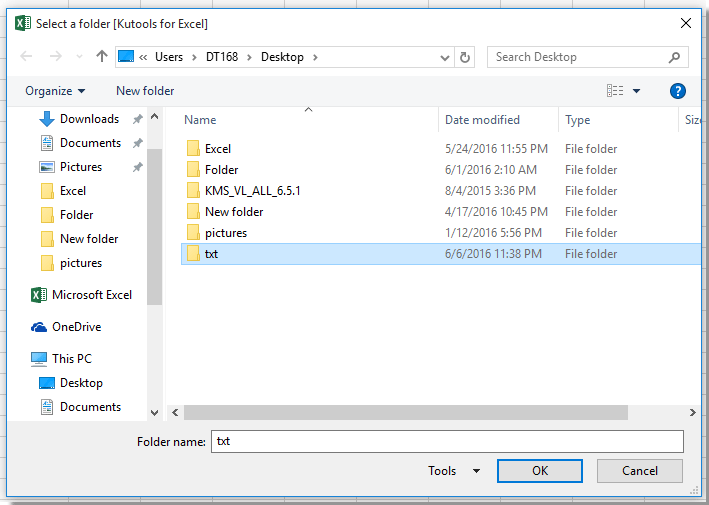
4. kettyenés OK. Ezután a szövegfájlokat külön új lapként importálták az aktív munkafüzetbe.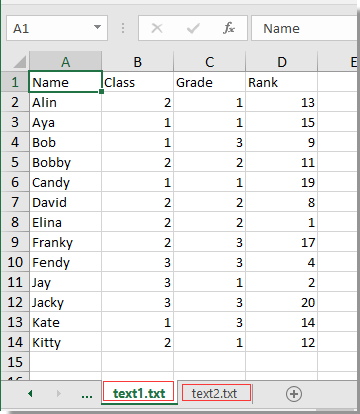
Importáljon szöveges fájlt az aktív cellába a Kutools for Excel segítségével
Ha egy szövegfájlt szeretne importálni egy adott cellába vagy tartományba, akkor alkalmazhatja Kutools az Excel számára'S Fájl beszúrása a kurzorhoz hasznosság.
| Kutools az Excel számára, Több mint 300 a praktikus funkciók megkönnyítik a munkáját. | ||
Után ingyenes telepítés Kutools for Excel, kérjük, tegye a következőket:
1. Jelölje ki a cellát, amelybe importálni szeretné a szövegfájlt, majd kattintson a gombra Kutools Plus > Import Export > Fájl beszúrása a kurzorhoz. Lásd a képernyőképet: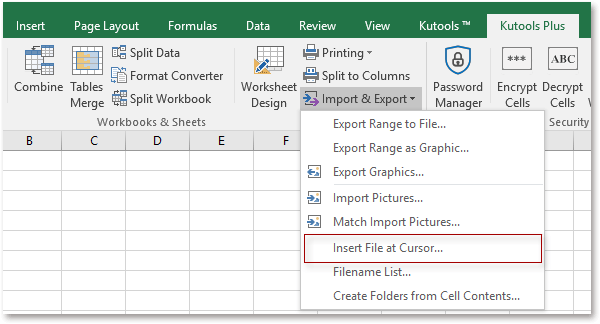
2. Ezután megjelenik egy párbeszédpanel, kattintson Tallózás megjeleníteni a Válasszon ki egy fájlt beillesztendő a cella kurzor pozíció párbeszédpanelen, válassza ki a következőt Szöveges fájlok a legördülő listából, majd válassza ki az importálni kívánt szövegfájlt. Lásd a képernyőképet: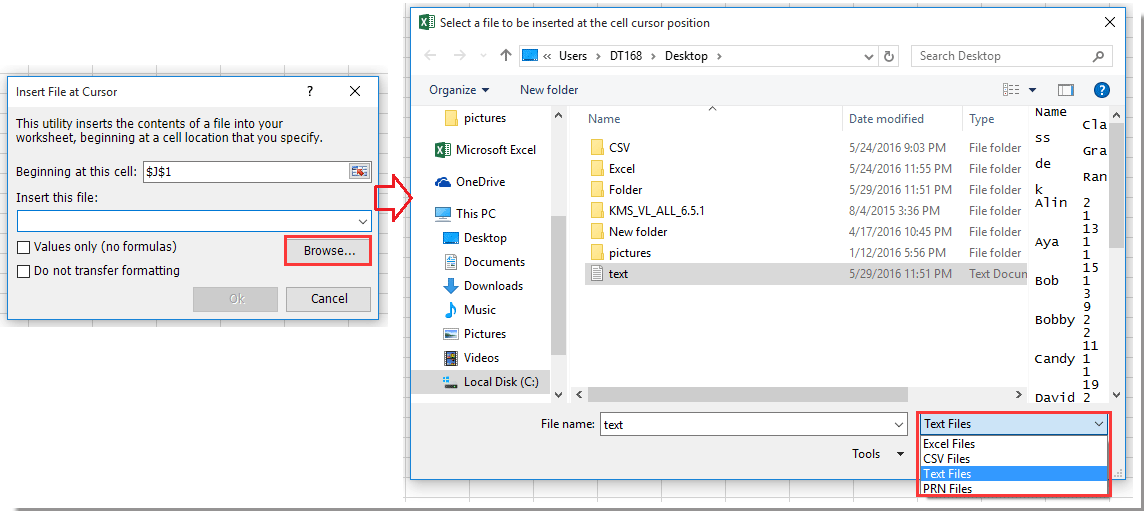
3. kettyenés Nyisd ki > Ok, és a szöveges fájl be lett illesztve a kurzor pozíciójába, lásd a képernyőképet: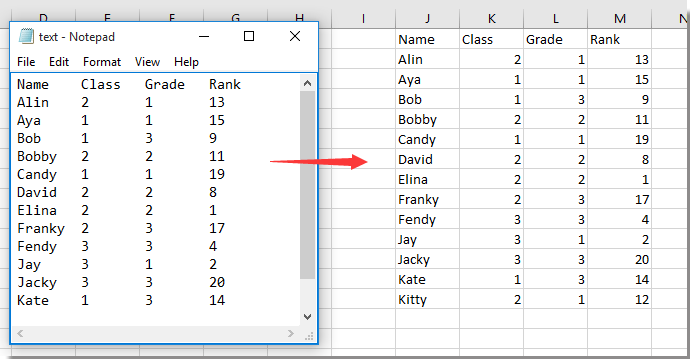
Szöveges fájl importálása / beillesztése a kurzorhoz
A legjobb irodai hatékonyságnövelő eszközök
Töltsd fel Excel-készségeidet a Kutools for Excel segítségével, és tapasztald meg a még soha nem látott hatékonyságot. A Kutools for Excel több mint 300 speciális funkciót kínál a termelékenység fokozásához és az időmegtakarításhoz. Kattintson ide, hogy megszerezze a leginkább szükséges funkciót...

Az Office lap füles felületet hoz az Office-ba, és sokkal könnyebbé teszi a munkáját
- Füles szerkesztés és olvasás engedélyezése Wordben, Excelben és PowerPointban, Publisher, Access, Visio és Project.
- Több dokumentum megnyitása és létrehozása ugyanazon ablak új lapjain, mint új ablakokban.
- 50% -kal növeli a termelékenységet, és naponta több száz kattintással csökkenti az egér kattintását!
